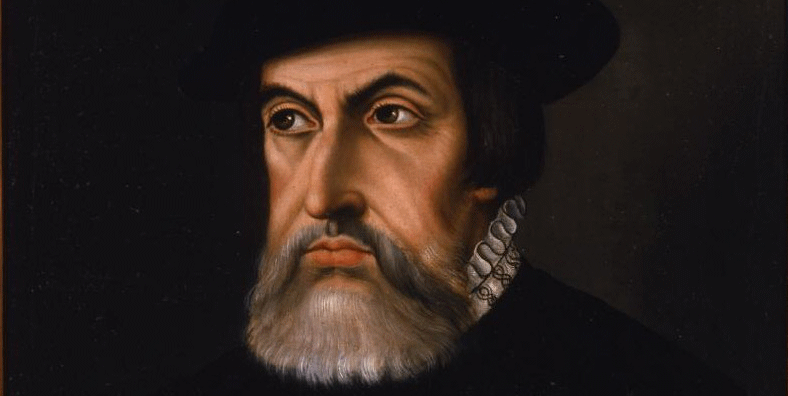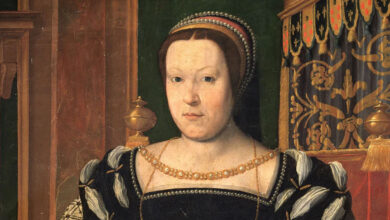
“I love to travel, but hate to arrive” – Hernando Cortes
Podcast: Play in new window | Download
Subscribe: Spotify | Amazon Music | Youtube Music | RSS
Hernando Cortes Biography
Hernándo Cortés, the famous, or perhaps more accurately, the infamous explorer was born in 1485 in Medellin, Spain. The son of an upper class, yet not very wealthy family, he began life as a skinny, sickly problem child. By the age of 14, his parents had shipped him off to the University Of Salamanca to study law. Instead of embracing the education he was offered, he didn’t put in the effort and eventually gave up to go back home. For a while, he acted like any other disgruntled teenager would, he lazed around the family home and did as little as possible.
Soon, he discovered a new interest. The discovery of the New World was on the lips of everyone around him and Cortés began to realize that this was what he wanted to do. Excited about a new adventure, he signed up to join an expedition and at the age of 19, he finally set sail on an epic journey. He spent his time working with the military, keeping native uprisings under control. He also had an affinity towards the ladies and was known to challenge many a man to a duel to decide who would win the girl over. No one really knows how well he did in these duels, but it was certainly good practice for what lay ahead. Over the next few years, Cortés took part in conquests of Cuba and Hispaniola with Diego Velázquez. As a result of his involvement, he gained land and native slaves and became an important man in Cuba.
In 1518 he convinced Velázquez, who had then become governor, to allow him to command an expedition to Mexico. This was the adventure that Cortés had always dreamed of. The New World had recently been discovered by Europeans and the rumours were swirling about the immense wealth that could be found there. Because he didn’t fully trust Cortés, Velázquez decided to cancel the expedition, but that didn’t stop Cortés. Instead of obeying orders, he gathered eleven ships and five hundred men and set sail anyway.
The expedition reached the Mexican coast in 1519 and Cortés quickly gained the trust of some of the native people whom he convinced to fight against other natives. He was bent on conquering Mexico and the Aztec empire was his first target. He raided the Aztec capital of Tenochtitlán and took the ruler, Montezuma II hostage. His escapades were cut short when he fled the city to avoid being caught by Spanish troops that were sent to arrest him for disobeying the orders Velázquez had given him. As brave as he was, he deeply feared being taken back to Spain under such shameful circumstances.
In his absence, a rebellion had begun in Tenochtitlán. Despite fighting feverishly to overcome the odds, Cortés and his army were driven out by the Aztecs. Undaunted, Cortés returned to the city in 1521 and eventually succeeded in defeating the Aztecs. As a reward for his accomplishments, King Charles I of Spain appointed him the governor of what they now called “New Spain” the following year.
Even with the outward appearance of success, Cortés faced many more challenges, particularly to his authority and position. In 1524, he was forced to travel to Honduras to fight a rebellion against him, which took him away from his Mexican power center. When he finally returned, he had been ousted from his governor’s position, lost all of his power and was left with nothing. He returned to Spain, a broken man, determined to plead his case to the King. It did him no good at all, he was never reappointed as governor.
Cortés finally returned to New Spain in 1530 where he made every attempt to prove his innocence in the face of accusations that he tried to poison the new leadership. He did everything that he possibly could to reestablish his position but to no avail. Eventually, he moved to Cuernavaca, where he built a beautiful palace that he called home. He didn’t just sit back and relax though, he continued to explore the Pacific coast and Baja California, seeking fame and fortune. Unfortunately for him, these explorations were not nearly as successful as his earlier exploits.
Dejected and, by this time in his 50’s, Cortés returned to Spain where he continued to fight to regain his power. He was almost entirely discounted by most, but did eventually win the emperor over and was allowed to fight against Algiers. It didn’t turn out quite as expected, in fact, Cortés nearly drowned during one battle. He gave in and returned to Spain to again face the music. It was all too much to bear and, again, he planned to leave it all behind and return to his beloved Mexico for an easy life of retirement. Unfortunately for him, he never left Spain again. On December 2, 1547, Cortés died a painful death due to the effects of pleurisy, a lung disease. He will always be known for his adventurous spirit and perhaps more so for his unethical behavior, but without Cortés and others like him, our world would not be what it is today.
Podcast: Play in new window | Download
Subscribe: Spotify | Amazon Music | Youtube Music | RSS




